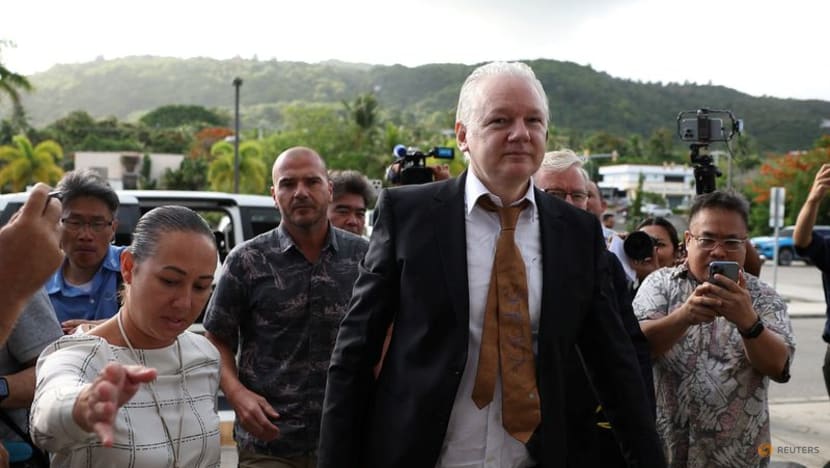WikiLeaks founder Julian Assange’s case may have ‘chilling effect’ on press freedom, say observers
Assange admitted to a single count of conspiracy to unlawfully obtain and disseminate national defence information under the United States Espionage Act.


This audio is generated by an AI tool.
WikiLeaks founder Julian Assange managed to regain his freedom following a years-long legal saga, but his guilty plea may have a “chilling effect” on press freedom, observers said on Wednesday (Jun 26).
The 52-year-old admitted to a single count of conspiracy to unlawfully obtain and disseminate national defence information under the United States Espionage Act, according to a US Department of Justice (DOJ) statement released on Wednesday.
The DOJ said that Assange is prohibited from returning to the US without permission.
Assange founded whistleblowing website WikiLeaks in 2006. From 2010, he published hundreds of thousands of secret US documents, for which he faced 18 charges in the US under the Espionage Act.
However, last week, he signed a deal with the US that allowed him to plead guilty to just one espionage charge.
On Wednesday, he received a court-imposed 62-month time-served sentence in Northern Mariana Islands, a Pacific US territory. The sentence reflected the time he had been detained in a high-security prison in the United Kingdom as a result of his US charges.
During his time in prison, he had been battling US attempts to extradite him from the UK. US authorities wanted to put Assange on trial for divulging military secrets about the wars in Iraq and Afghanistan.
“There are concerns … that Julian Assange has pled guilty to one misdemeanour under that Act, and what kind of chilling effect that will have on press freedom, not just in the United States, but globally,” Dr Emma Shortis, senior researcher at The Australian Institute’s International and Security Affairs department, told CNA’s Asia First.
“(It) would set an extraordinary precedent where the US could go after non-citizens under that Act, while simultaneously denying them the protections of US law, particularly First Amendment protections,” she said.
Such an ability to pursue journalists for publishing in the truth would be “extraordinarily damaging to press freedom”, she added.
“It was really untenable for the US Department of Justice to be pursuing a journalist in this way, from the biggest and most important democracy in the world. That was irreconcilable, I think, with the stated values of the United States,” said Dr Shortis.
WHY THE PLEA DEAL?
Despite the reduced charges due to the plea deal, Assange admitting guilt on even one count is “problematic” as it means that on record, a publisher has been successfully prosecuted, said Dr Binoy Kampmark, senior lecturer of global, urban and social studies at RMIT University in Melbourne, Australia.
“The charge is still significant … It means that outside the United States, publishers are not really safe. Outside the United States, journalists and outlets are not necessarily safe,” he said.
Dr Kampmark said that the plea deal was a result of several factors, including efforts by the Australian government and Assange’s family.
Australia's alliance with the US and the UK under the AUKUS arrangement, which involves Australian investment in areas like submarines, nuclear propulsion and technology worth billions, could have been used as leverage in convincing the Biden administration, he added.
Another reason could have been operational details that the US’ Central Intelligence Agency would never have wanted to see in court, he said.
THE USE OF THE US ESPIONAGE ACT
The indictment unsealed by the Trump administration was an unprecedented use of the 1917 Espionage Act that has the potential to – as in this case – criminalise journalistic activity, said Dr Shortis.
A non-American citizen being charged under the Act was “completely inappropriate and should never have been pursued”, she added.
“Julian Assange is not an American citizen and had no obligation to maintain protections and secrecy of American documents,” she said.
The Act was not intended for this purpose, said Dr Kampmark, noting that it was passed in 1917, just as the US was entering World War I.
It was designed to attack subversive literature, pacifists, those against the US war effort, and critics of the US entry into the war on the side of the Allies against the Germans and the Central Powers, he said.
Related:
“The fact that it's being used against not just a publisher, but a non-US citizen whose publishing activities took place outside the United States is something that's never been done before,” he said.
“This is a very dangerously novel way of using the Espionage Act … Essentially, territorial limitations have been totally ignored in this enterprise.”
Assange’s wife Stella, a lawyer, has reportedly said she will seek a pardon for his conviction on the grounds that the case was an incorrect application of the Espionage Act, and that he was just doing his job as a journalist.
However, Dr Kampmark said that he does not see a pardon taking place in the immediate future.
“It's very hard to think that (US) President (Joe) Biden will be doing this precisely because there's already been this brokered plea deal and it will probably be left to the next president to contemplate that,” he said.














